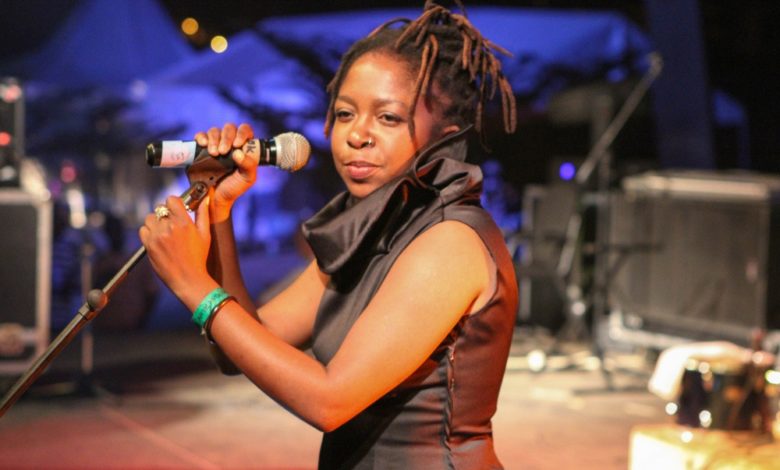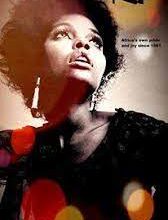Chioneso Maraire – A Legend in her own right. A Zimbabwean singer, songwriter, and proponent of Zimbabwean mbira music.
Read her story and watch one of her sentimental videos

Profile Chiwoniso sister Chi Maraire – The Song Maker

By Kamangeni Phiri
WHEN mbira maestro, Chiwoniso Maraire, learnt that her family would be permanently relocating to Zimbabwe from the United States in 1991, she was excited.
The songstress looked forward to the transition as her legendary father, the late Dumisani Maraire, had often told her stories about Zimbabwe’s rich culture and that it was home to her favourite musical instrument – the mbira.
But when she finally arrived in the land of her ancestors aged 15, her anticipated transition turned into a culture shock.
“The shock was not from the language; our parents had kept us closely linked to Shona. My real difficulty was that I had been living in this huge musical community, sort of surrounded by musical people, in Seattle. And they were all learning marimba and mbira from my dad. When I found out we were going back to Zimbabwe I was excited. I thought, “Well, I am going to get to Zim and find all these musicians playing this music, and it was a real shock to find out that was not the case,” Chiwoniso told US based Zimbabwean journalist and writer, Dzana Tsomondo in a 2011 interview.
The then young Chiwoniso, who had enrolled at Mutare Girls High as a student, concluded that locals shunned their culture because of the whole colonial hangover that was attached to mbira and marimba, “Especially mbira as an instrument, because of its spiritual connection and its power,” she added.
The above shows how much Chiwoniso or Chi was attached to the mbira instrument.
Born in 1976 in Olympia, Washington, Chiwoniso was Dumisani’s fifth child out of eleven kids he had with four different women. Dumisani and Chiwoniso’s mother had five kids together and she was the oldest.
Chi’s romance with mbira music started when she was still a baby when she would crawl to the basement of their apartment where her father would be rehearsing. She would play around with mbira, according to her father.
By the time she turned four, Chiwoniso or Chi, had begun playing the mbira instrument. She recorded her first album with her parents when she was nine. When she turned 11, she was performing with her father and her siblings, Tawona and Ziyanai, in the family mbira group, Mhuri yaMaraire. Sister Chi also played in her father’s mbira group Mimhanzi III (Musical Sounds 3).
But her effort to generate interest in the mbira instrument among the youths started in early 1991 when she met two young men, Herbert Schwamborne and Tony Chihota in Harare while she was on school holiday. Tony and Herbert had just formed their own hip-hop music group named A Peace of Ebony. They met at a freestyle clash where Chiwoniso impressed the duo with her singing, beat-boxing and free-styling some rap. Tony and Herbert immediately asked her to join the group as its first girl member, and she agreed.
With A Peace of Ebony Chiwoniso started to compose her own songs and released an album in 1992, From a Native Tongue which had the hit song, Pretend It Never Happened that did so well on the local and international musical charts. In 1994, the group released a single, Vadzimu, a rap track with Shona and French lyrics which won the Best New Group out of Southern Africa award in the Radio France International Discovery contest.
“With Piece of Ebony, we incorporated mbira … but yeah, that was one of the hard things,” she confessed in one of her many interviews.
Given her girlhood exposure to music in general and mbira music in particular while still in the US, the irony was not lost on Chiwoniso that her first musical group in her country of origin was a hip-hop group.
The group disbanded in 1994. Soon after, Keith Farquharson who was producing the group’s music invited Maraire to do backing vocals on the music of his former Ilanga band mate, guitar maestro, Andy Brown and his band, The Storm.
Chiwoniso began to sing backing vocals for Brown as well as collaborating with him as a band member of The Storm.
Brown – a talented guitarist and musical genius in his own right – was a maverick musician who played a critical role in Chiwoniso’s musical development and personal life.
The two ended up dating and eventually got married. Chiwoniso and Brown had two daughters together but their marriage was over after five years. There were allegations levelled against Brown of physically and emotionally abusing Chiwoniso.
Chiwoniso’s debut album, Ancient Voices, released in 1998, was a brilliant project that merged Maraire’s mbira skills and extraordinary vocals with Brown’s guitar wizardry. She was backed by her band, The Culture Vibes.
The album contained classic tunes like Mai, Wandirasa, Ivai Nesu and Nhemamusasa. The track Mai, was an ode to her mother, Linda Chengeto Maraire, who died in 1997. Nhemamusasa, a traditional mbira song, was recreated through the addition of trumpets and percussion. The emotive track, Ivai Nesu, proved to be a favourite of many. Wandirasa, a song of love and loss, was also a standout hit.
Chiwoniso effortlessly blends Shona and English in her songs. Her music is a fusion of genres that include hip hop, Zimbabwe traditional music and afro jazz and connects with the young and the mature alike.
The youth are apparently lured to her music by the hip-hop beat while the mature listener is captivated by the mbira dominated traditional beat.
Chiwoniso believed in the supernatural world and claimed some of her songs were composed after she heard voices from the dead while others were products of her experiences in life and dreams.
She says lyrics for the song Mai, came to her while walking down the street one day soon after the death of her mother when all of a sudden she heard a voice calling, “Chiwoniso”.
“The voice said: ‘It’s okay, I know that you are hurting but I am here, I am with you, I am not gone you know. I’ve just gone to a different place but I’m still with you’. That’s how I wrote the song Mhai,” explained Chi in 2013.
Many believe the song Wandirasa was inspired by her fallout with Brown, a man she loved until the time of her death, according to close friends. Chiwoniso recorded a number of songs that reveal her concern for the underprivileged like Bread and Roses. Her passion for the less fortunate led her to record Madame 20 Cents, Tamari, In This Life and Rebel Woman, the title track of her third album.
Like most mbira music, Chiwoniso’s works had the power to drive fans at live shows into trance-like stance. The songstress, however, denied that she was a spirit medium.
“But I am very much in tune with the spiritual world and most of my close friends are also very in tune. There have been times when I have been in ceremonies and you are just overcome by the strong energy, and how it affects other people deeply. I have always taken these experiences as a reaffirmation that we are not alone, that there is so much more about existence than what we are able to see and perceive,” she said.
That Chiwoniso succeeded to make a name for herself while playing mbira music at a time the instrument had already been immortalised by legends like Thomas Mapfumo, Dumie Maraire and Stella Chiweshe, speaks volumes of her talent.
More than any artist before her time, sister Chi made the mbira instrument move into the 21st century, resulting in her being considered a revolutionary who helped reimage culture’s relationship with the traditional instrument.
She also worked with poet Chirikure Chirikure, a family friend, on many projects, with Chirikure performing his poetry and Maraire playing mbira in accompaniment. Chi also did some soundtracks for films and documentaries while working with different organisations that included the UN.
Her divorce with Brown affected her and she began to lean heavily on alcohol, which began to affect her performance.
In 2013, Chiwoniso had a lingering cough and her friends took her to South Medical Hospital in Chitungwiza for a checkup where she got admitted. The queen of mbira music passed away at the age of 37 on 24 July of the same year from pneumonia after spending two weeks in hospital.
Family members did not allow her body to enter her home and spend the night, as per local tradition. She was buried at her rural home in Chakohwa, Chimanimani.


